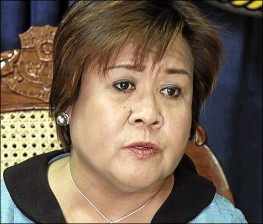De Lima: No direct link of poll fraud to Arroyo
There’s no direct evidence to link President Gloria Macapagal-Arroyo to allegations of election fraud, acknowledged Justice Secretary Leila de Lima in an interview with Radyo Inquirer on Tuesday.
“What we have gathered point to them at least, enough to include them in the filing of the case on electoral fraud,” she said.
Two new witnesses, Lilian Radam and Yogi Martirizar, in a statement issued through their lawyer, on Tuesday insisted that former Comelec Chairman Benjamin Abalos was the “brains behind the poll rigging.”
They said that the earlier charges filed against them were a “smokescreen” to cover an already “tarnished image” of the Comelec after Abalos was implicated in the NBN-ZTE scandal.
Article continues after this advertisement
Why now? Why not earlier?
Article continues after this advertisementJames Jimenez, spokesperson of the Commission on Elections (Comelec), raised this question a day after the witnesses, two provincial poll supervisors emerged from four years in hiding to accuse Abalos of ordering them to rig the 2007 senate vote.
The two supervisors—Radam of South Cotabato and Martirizar of North Cotabato—were charged by the Comelec with election sabotage four years ago for allegedly submitting spurious poll paraphernalia.
On Tuesday, they turned the tables on Abalos, saying he called a meeting of poll officials in Davao City and announced to them that they have to work for a 12-0 sweep of then President Gloria Macapagal-Arroyo’s candidates in the senatorial elections.
Both Radam and Martirizar claimed in sworn statements that their handlers in the Intelligence Service of the Armed Forces of the Philippines (Isafp) and regional Comelec Director Michael Abas had told them that Abalos wanted the victory on orders of the Palace.
Best judge
While saying that the best judge of the credibility of Radam and Martirizar would be the joint Comelec-Department of Justice panel investigating the case, Jimenez said that if the two supervisors could not come out while Abalos was Comelec chair, they could have surfaced after Abalos quit and was replaced by Jose Melo.
“As far as the Comelec is concerned, all we know is that they were in hiding but they could have come up with these revelations [during the] administration of Chairman Melo. If they were afraid of Abalos that time, why didn’t they speak out when he left office?” Jimenez said.
“When they were being internally investigated in Melo’s time, why did they not defend themselves so that they wouldn’t have been charged. [In Radam’s case] the case is already filed in court and it’s only now that she’s coming out. We want to clear why they chose to time their revelations this way,” Jimenez added.
Jimenez noted that Radam was charged with electoral sabotage in South Cotabato. He said similar charges were being prepared against Martirizar.
“They are just adding or claiming now that they were working for someone. That they were working for Abalos who was working allegedly for President Arroyo—that’s all. But with regards to cheating, there are already cases,” he added.
Abalos resigned in October 2007; his successor, Melo, served from March 2008 to January 2011.
Abalos has denied the allegations of Radam and Martirizar.
Isafp handlers
Colonel Arnulfo Burgos Jr., AFP spokesperson, said only one of the three supposed Isafp officers implicated by the two supervisors in the alleged vote rigging remained in active service—Colonel Ruben Basiao, who is assigned in Mindanao.
The other, Lt. John Oliver Leaban, identified by the whistle-blowers as Maj. Joey Leaban, died April 10 of old battle wounds. There was no record of a Captain Peter Reyes, claimed an Isafp “handler.”
“In due time, we will have our own investigation,” Burgos said.
Last month, incumbent Comelec Chairman Sixto Brillantes Jr. and Justice Secretary Leila de Lima announced the creation of the joint committee to investigate alleged cheating in the 2004 presidential and 2007 senatorial elections.
Brillantes and De Lima, who were lawyers of opposition candidates who claimed to be victims of cheating, have said they would inhibit themselves from the inquiry.
Radam and Martirizar claimed Abalos pressured them to prepare a different set of certificates of canvass and statements of votes showing altered results favoring four administration candidates in their areas. They claimed they were assisted by the Isafp operatives in the cheating.
Jumping on bandwagon
Asked if it were possible that the Comelec had printed the extra “genuine” documents used in the cheating, Jimenez replied: “That’s a bit remote because there are records how many were printed. The flow of documents is recorded … It’s possible they were able to manufacture documents resembling the genuine ones.”
He said that while it was possible that Radam and Martirizar only wanted to pass the blame on someone else, it was also possible that “they feel empowered because of the new administration and their belief that everything will change.”
“There’s also the possibility that they found a way to possibly excuse themselves by simply jumping on the bandwagon,” he said. With reports from Dona Z. Pazzibugan, Nikko Dizon and Jimmy Tamayo, Radyo Inquirer
